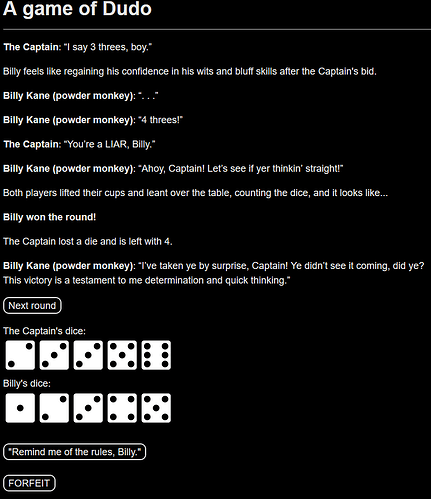Thoughts
I read all the help text, played for a while, restored to hints, quit in frustration.
What worked for me
I had more fun with HOWT than I did with previous entries, even though I didn’t get terribly far. I deeply admire all the work that went into this custom engine, which is generally quite full-featured. Implementation seems very solid throughout. The help text is many pages long, including bindable hotkeys for common commands! It’s also charming, and colorful, and some light but effective ASCII art really made the game pop.
Good use of sound effects! I actually felt these were additive to the experience, which is rare for me.
Also, there’s a good hint system! Which I turned to a few times.
The objective was clear, thanks to a letter: Go find the Orb! And some of the actions are immediately fun, we get to do wizardy things (appropriately mundane wizardy things, even).
What worked less well
A lot of the text here wants an editing pass. In several places I thought cutting half the words would have tightened up the writing. This sentence that sets up your bad day:
The first thing was when your horse, which hitherto had calmly been grazing on the grass which carpeted the forest floor, took it into his head to make a bid for freedom and bolted between the trees and out of sight.
…could be “First, your horse bolted” without losing any plot-relevant detail. Or once inside the cottage near the start:
You seem to be in the lower part of the cottage, a narrow stairway leading up in one corner to a higher level, presumably into the tower from which at an earlier point you saw the bird take flight. On the floor in the centre of the room stands a large table which looks as if it is make of oak, while just above it, attached to the wall, there is a stout-looking shelf. To the north there is one other exit leading into what appears to be a garden.
…perhaps, “You are in the cottage. A narrow stair probably leads into the tower you saw earlier. A large oaken table stands in the centre of the room, beneath a stout shelf. You can exit into a garden to the north.” There’s hesitation and qualification in the text - extra clauses for every statement - that makes it difficult to scan. Nevermind that you have to examine the table to see if something is on it!
The descriptions aren’t great at calling your attention to what is or isn’t important. The game will sometimes describe something as “unusual” but won’t say in what way, and it turns out to be inconsequential scenery.
Around you stretches a dank dim forest whose floor is carpeted by dense and varied undergrowth, the main component of which is an unusual type of fern. […]
> X FERN
They’re of a type you’ve never before seen.
> TAKE FERN
You can’t take the fern.
Then, there are some conveniences missing:
After a short delay, the door opens with a soft creaking sound.
> IN
A direction would seem more appropriate.
> X DOOR
The door is open.
> ENTER DOOR
How do you propose to enter the door?
> WALK INSIDE
Please put that another way
> GO INSIDE
Please put that another way
> INSIDE
You appear to have omitted a noun.
> ENTER COTTAGE
[Works!]
For some folks there may be an oldschool charm to this. I find it frustrating. There are other examples of frustrating interaction design: READ BOOK shows me the cover, OPEN BOOK then READ BOOK shows me page 1, TURN PAGE then READ BOOK shows me page 2, and so on. I’ll admit this was convenient when I needed to consult the same page over and over, but I’d almost rather it had a simpler interface and expected me to take notes. Spells seem to be an unlimited resource but must be LEARNed again every time they’re used. A secret switch could be PUSHed but TOUCH didn’t work or hint that I was close.
The cube-room maze I understood immediately, but it was a bit tedious to enter all of the commands to get through it (even entering many on a line). When I was eventually returned to the starting cottage and realized I’d have to go through the maze again, I quit because I didn’t want to type out the twenty-odd commands again. (I’ve been spoiled by Hadean Lands for this sort of thing.)
Overall I might be missing the point of this game - it advertises itself as an ‘old-school’ style game, and it’s possible my complaints above are exactly the sort of thing that makes this appealing to a certain audience. I found some of the puzzle design frustrating too, but I’ve largely left that out of the review because it feels very intentional, and is something I can bounce off of. Super conflicted on this one - obviously so much work went into it, but I’m also very frustrated with it. I’d love to see a few of these experience things changed up while keeping the oldschool puzzles and pace.

